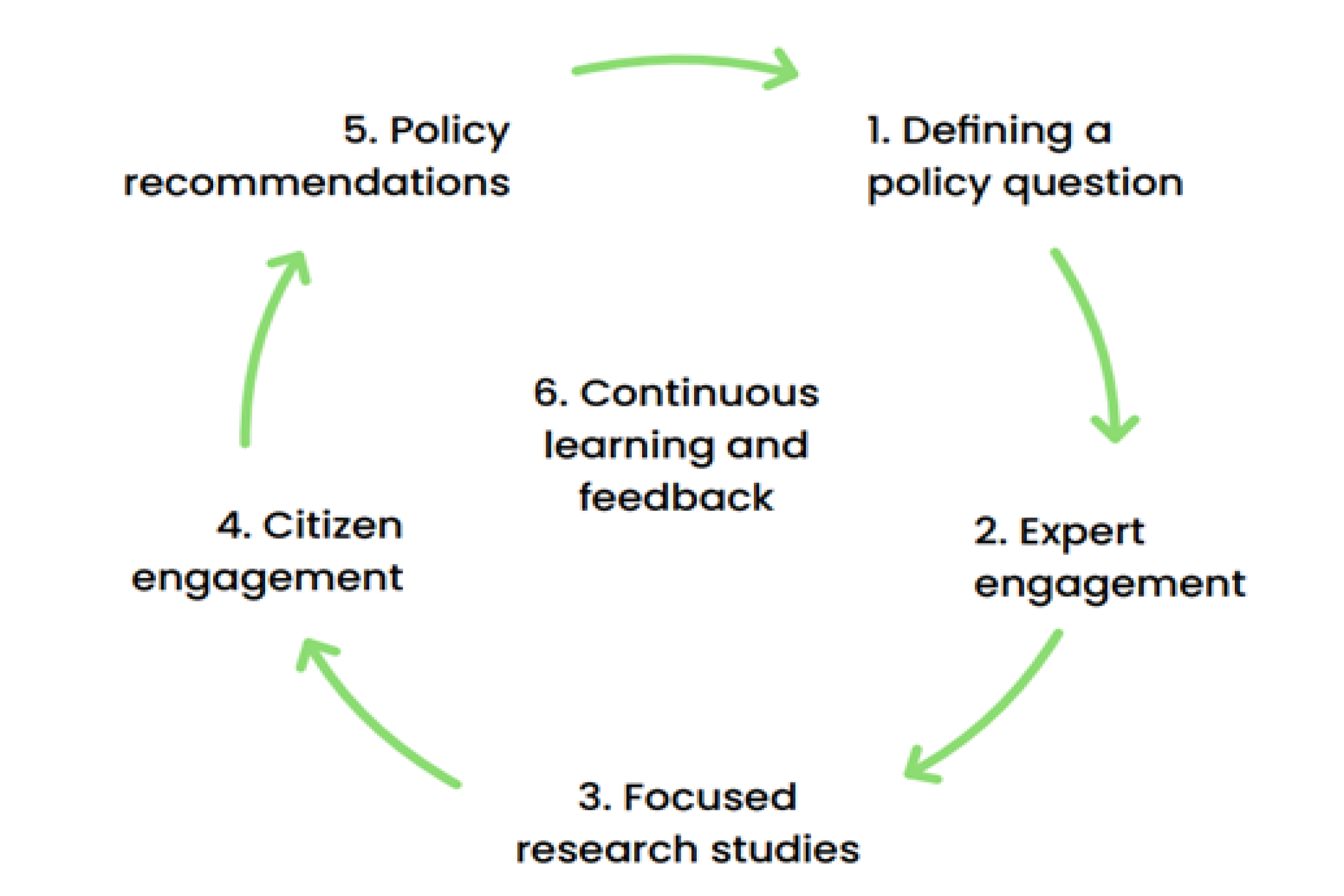In this piece, Reema Patel, Ipsos, discusses the findings of deliberative engagements, highlighting public opinion on and providing policy solutions for key election issues including the cost-of-living crisis, economic growth, inequality, healthcare and decarbonisation.

Informing the 2024 Election Agenda – Deliberative Views on Policy Choices and Trade-Offs Ahead of the UK election
Deliberative processes, such as citizen juries and assemblies, are increasingly seen as avenues for fostering informed dialogue and collaborative decision-making among diverse stakeholders. These processes have gained attention as potential mechanisms for enhancing the openness and effectiveness of policymaking, with recent discussions suggesting their utility in shaping the policy agenda for the upcoming UK election. They have recently been mooted as a potential mechanism for opening up policymaking by Sue Gray, advisor to Keir Starmer. Deliberations share the unique feature of convening a diverse group and cross-section of the modern British public (a ‘mini public’). By involving participants from various backgrounds and perspectives in dialogue with specialists and policymakers, they have the potential to enhance legitimacy, transparency, and accountability in governance, ultimately leading to more effective and sustainable policies and research. Drawing upon a series of Ipsos-led deliberative engagements conducted between 2022 and 2024, this article seeks to distil key insights into the election landscape and offer nuanced perspectives on policy directions.
What are the key election issues at play?
Findings from Ipsos surveys underscore the centrality of a range of social and economic concerns, with the economy and inflation ranking as top priorities for British voters. Close behind is the perennially important issue of the National Health Service (NHS). Additionally, discussions within deliberative forums have brought attention to the imperative of charting pathways to achieve net zero emissions, while considering the associated challenges of affordability and societal acceptability.
Addressing the cost-of-living crisis
Insights gleaned from a recent Citizens’ Economic Council led by Ipsos/Kings College London shed light on citizen perspectives regarding economic policy responses to the cost-of-living crisis. Participants, drawn from diverse backgrounds across the UK, emphasised the need for crisis-response measures that prioritise the most vulnerable segments of society. Discussions revolved around the importance of fair taxation, with calls for redistributive measures aimed at rewarding labour and targeting unearned income and wealth. They expressed concerns about sharp thresholds and taper rates in taxation and benefits systems, advocating for a more gradual approach to avoid unfairness. Looking ahead, participants stressed the need for longer-term thinking in economic planning, urging the government to invest in resilience-building measures to mitigate future crises.
Balancing productivity and inclusivity
Deliberative workshops held in Manchester and Birmingham as part of the Economy 2030 Inquiry underscored residents’ aspirations for transformative change within their city regions. While participants acknowledged the importance of economic growth, they expressed reservations about a narrow focus on productivity that might exacerbate existing inequalities or lose focus on creating broader prosperity and wellbeing. Calls were made for inclusive growth strategies, accompanied by robust social safety nets and expanded opportunities for all citizens. There was a palpable concern among participants regarding the potential impact of growth agendas on housing affordability and living standards, signalling a desire for policies that prioritise social equity alongside economic progress. While they acknowledged the necessity of economic growth, participants were wary of a single-minded pursuit of productivity without regard to the distribution of benefits and gains from productivity, fearing it could further exacerbate inequality and social divisions. Moreover, participants expressed scepticism about the “trickle-down” effect of economic growth and called for policymakers shaping the future of city regions to develop deliberate policy interventions to ensure its benefits reach all parts of the city region. They stressed the importance of spatial planning, protection of green spaces, and investment in public services as essential components of any growth strategy.
Fairness in NHS access through waiting lists
Discussions surrounding NHS waiting list prioritisation in Coventry and Warwickshire with the Strategy Unit highlighted the multifaceted nature and complexity of notions of fairness within healthcare systems. While some consensus existed regarding the importance of fairness, participants held divergent views on how best to achieve it. Some prioritised clinical urgency, while others emphasised equitable health outcomes. Despite recognising the limitations of waiting list prioritisation in addressing systemic issues, participants emphasised its potential to enhance efficiency and equity within the healthcare system. They stressed the need for transparent and inclusive decision-making processes, with adequate human involvement to mitigate biases and unintended consequences. Moreover, participants expressed a range of views on the factors to consider in prioritising waiting lists, with data about individual health conditions receiving broad acceptance. However, factors related to social determinants of health proved more divisive, with concerns about unintended consequences for certain groups and generalisation across different groups without accounting for the specifics of individual circumstances. Overall, the deliberation highlighted the importance of balancing fairness, efficiency, and human involvement in addressing waiting list challenges within healthcare systems.
Net zero futures – pathways to net zero
A deliberative public dialogue commissioned by the Government Office for Science and by Sciencewise delved into citizen perspectives on achieving net zero emissions. Participants highlighted concerns about inequalities and health impacts associated with transitioning to a low-carbon economy. While acknowledging the role of technological innovation, participants expressed scepticism about over-reliance on specific technologies, particularly if they exacerbate social and economic disparities. There was a consensus on the need for policies that balance environmental objectives with considerations of affordability, health equity, and community engagement. Overall, the deliberative process highlighted the importance of balancing technological innovation, sustainability, health/wellbeing goals, and lifestyle choices while addressing concerns about affordability, equity, health, and community involvement in shaping future net zero visions.
Conclusion
Participants in our public deliberations consistently underscored the importance of fairness, equity, and sustainability across various policy domains. Their diverse perspectives highlight the necessity of crafting inclusive policies that address the specific needs and challenges faced by different communities. As the UK prepares for the upcoming election, these deliberative insights serve as a reminder of the importance of engaging citizens in shaping the policy agenda, thereby fostering a more responsive and inclusive approach to policymaking.
For more on how best to do this, please see Ipsos’s Inclusive Policymaking Toolkit. This sets out a six-step process, informed by pilots worldwide, on how best and most effectively to ensure citizen engagement is seamlessly embedded into the policymaking process:

About the author
Reema Patel is Head of Deliberative Engagement at Ipsos.
She specialises in complex, multi-country programmes of citizen engagement – most recently directing the Global Science Partnership for climate action as part of the UK’s COP26 Presidency and advising People Powered, a global hub for participatory democracy.
She is also Policy Engagement Lead for the ESRC+ Digital Good Network, and she is an Associate Fellow at the Leverhulme Centre for the Future of Intelligence, a research institute exploring the impact of AI based in Cambridge.
Formerly, she was Associate Director at the Ada Lovelace Institute, an independent thinktank seeking to ensure that data & AI work for people and society where she led the organisation’s public attitudes and public deliberation research, and was a member of its founding team. She also served for 8 years as a councillor on Barnet Council.
Image credit: Felicia Buitenwerf, Unsplash